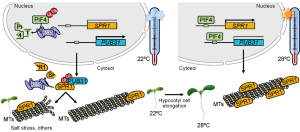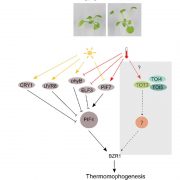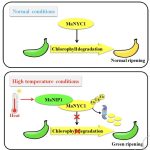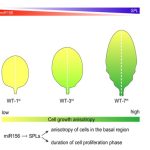PIF4 regulates microtubule organization to mediate high temperature–induced hypocotyl elongation
 Plant growth adaptation to heat stress (thermomorphogenesis) is regulated by changes in plant morphology such as petiole and hypocotyl elongation. One of the known players in this response is PHYTOCHROME-INTERACTING FACTOR 4 (PIF4), a central regulator of hypocotyl elongation. However, the mechanisms underlying the response, including PIF4 interactors, are unclear. In addition, cortical microtubules can sense environmental signals and are related to the status of the of hypocotyl cells. In this work, Zhou et al. identified microtubule-associated proteins (MAPs), such as MAP SPIRAL1 (SPR1), involved in temperature-induced hypocotyl elongation. They used loss-of-function spr1 mutants of Arabidopsis thaliana, which showed shorter hypocotyls at 28 ºC. Expression of SPR1 increased with higher temperature in a PIF4-dependent manner. The authors not only proved the role of SPR1 but also highlighted the function of PLANT U-BOX TYPE E3 UBIQUITIN LIGASE 31 (PUB31), which ubiquitinates and degrades SPR1 when it is not necessary. In high temperature, PIF4 induces SPR1 which suppresses PUB31 expression, resulting in the accumulation of SPR1 that promotes hypocotyl cell elongation. This is one of the first works that fine tunes the mechanisms of microtubule modulation during heat stress in plants. (Summary by Eva Maria Gomez Alvarez, @eva_ga96) Plant Cell 10.1093/plcell/koad042
Plant growth adaptation to heat stress (thermomorphogenesis) is regulated by changes in plant morphology such as petiole and hypocotyl elongation. One of the known players in this response is PHYTOCHROME-INTERACTING FACTOR 4 (PIF4), a central regulator of hypocotyl elongation. However, the mechanisms underlying the response, including PIF4 interactors, are unclear. In addition, cortical microtubules can sense environmental signals and are related to the status of the of hypocotyl cells. In this work, Zhou et al. identified microtubule-associated proteins (MAPs), such as MAP SPIRAL1 (SPR1), involved in temperature-induced hypocotyl elongation. They used loss-of-function spr1 mutants of Arabidopsis thaliana, which showed shorter hypocotyls at 28 ºC. Expression of SPR1 increased with higher temperature in a PIF4-dependent manner. The authors not only proved the role of SPR1 but also highlighted the function of PLANT U-BOX TYPE E3 UBIQUITIN LIGASE 31 (PUB31), which ubiquitinates and degrades SPR1 when it is not necessary. In high temperature, PIF4 induces SPR1 which suppresses PUB31 expression, resulting in the accumulation of SPR1 that promotes hypocotyl cell elongation. This is one of the first works that fine tunes the mechanisms of microtubule modulation during heat stress in plants. (Summary by Eva Maria Gomez Alvarez, @eva_ga96) Plant Cell 10.1093/plcell/koad042









